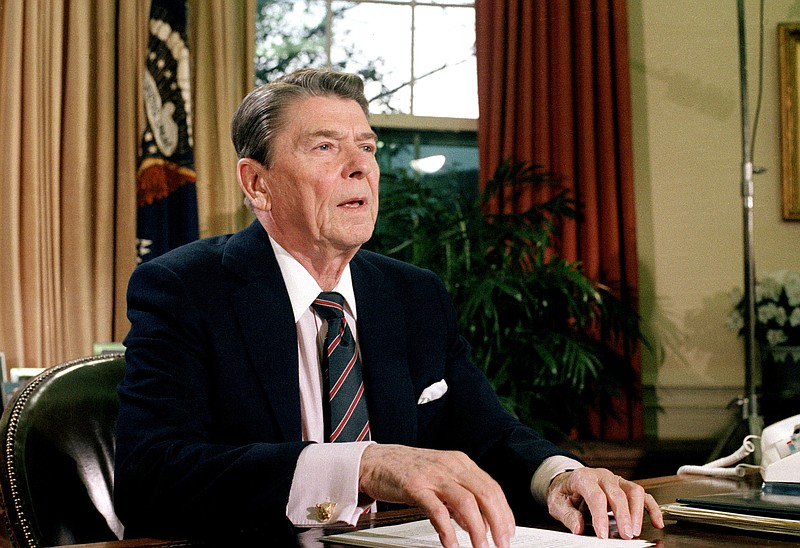You've been hearing for months that Tuesday's presidential election may be the most important one in our lifetime, or in modern America, or in our history. Of course, people have been saying that for decades.
Syndicated columnist David Shribman argues that three previous U.S. presidential elections might have lived up to that designation. The fourth, he says, is this year.
But we've been thinking about the second of his examples - 1964.
We believe, of the three (1860, 1964 or 1980), it offers the closest parallel to this year.
In 1860, the winner likely would confront a war. In 1980, the choice was between a thriving sense of dependency on the federal government and a move away from that dependency.
In 1964, though, President Lyndon Johnson wanted to revive and greatly expand President Franklin Roosevelt's New Deal policies and was in the process of doing that on the basis of sympathy for his assassinated predecessor, President John F. Kennedy.
The re-election of the president that year not only brought on a giant expansion of government but also policies that have forced (or allowed, some would say) people to be dependent on the federal government ever since. It drove wedges in the middle of low-income families, authored the rise in single-parent homes and cemented generations of poverty for millions.
Democrat Joe Biden envisions another such expansion of federal government authority. He seeks to add more people to government-run health care, wants the government to determine what type of energy is proper, eyes federal control over what buildings are erected and how they are designed, wants the treasury to erase college debt and finance college educations, and ensures the fed's wallets will expand by increasing tax collection on job creators (which slows job growth, depresses take-home pay and ultimately forces layoffs).
We think of 1964 also because of future California Governor and future President Ronald Reagan's speech shortly before the election in favor of the Republican presidential candidate, U.S. Sen. Barry Goldwater.
It's not remembered for what he said about the election or the candidate but what he portended for America's future.
Now called "A Time for Choosing," the speech highlighted the growth in government spending under Johnson, the increased size of the federal bureaucracy, the rise in taxes, the promulgation of the welfare state, the dependency on international organizations and the general creep of socialism.
All that Reagan foresaw has occurred - and not for the good.
The speech contained numerous lines from 56 years ago that ring true today.
To wit:
* "This is the issue of this election: Whether we believe in our capacity for self-government, or whether we abandon the American revolution and confess that a little intellectual elite in a far-distant capitol can plan our lives for us better than we can plan them ourselves."
* "'[T]he full power of centralized government' - this was the very thing the Founding Fathers sought to minimize. They knew that governments don't control things. A government can't control the economy without controlling people. And they know when a government sets out to do that, it must use force and coercion to achieve its purpose. They also knew, those Founding Fathers, that outside of its legitimate functions, government does nothing as well or as economically as the private sector of the economy."
* "No government ever voluntarily reduces itself in size. So governments' programs, once launched, never disappear.
"Actually, a government bureau is the nearest thing to eternal life we'll ever see on this earth."
Reagan could see what many then and now won't admit - that more government means less freedom and that less government means more freedom.
It's a simple concept, really.
As Reagan said in the speech, "Well, the trouble with our liberal friends is not that they're ignorant; it's just that they know so much that isn't so."
Interestingly, he also described 2020 in another area of the address, when he said: "Our Democratic opponents seem unwilling to debate these issues. They want to make you and I believe that this is a contest between two men - that we're to choose just between two personalities."
We would wager most people will be doing just that this year. They're either for Trump or against him, based on his personality (which can be jarring). We've heard or read next to nothing extolling the virtues of Joe Biden and his specific plans for the country.
In 2020, we should be beyond that. With all the facts at our disposal, minus the dreck of social media, we should be able to see the ruination a huge expansion of government will bring.
Reagan put it this way: "You and I have the courage to say to our enemies, 'There is a price we will not pay.'"
If this, in fact, is one of the most important elections in U.S. history, some of the final words from the 1964 speech are apropos:
"You and I have a rendezvous with destiny," Reagan said.
"We'll preserve for our children this, the last best hope of man on earth, or we'll sentence them to take the last step into a thousand years of darkness."
Choose wisely.
